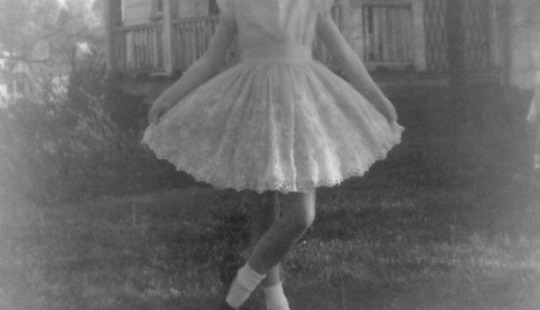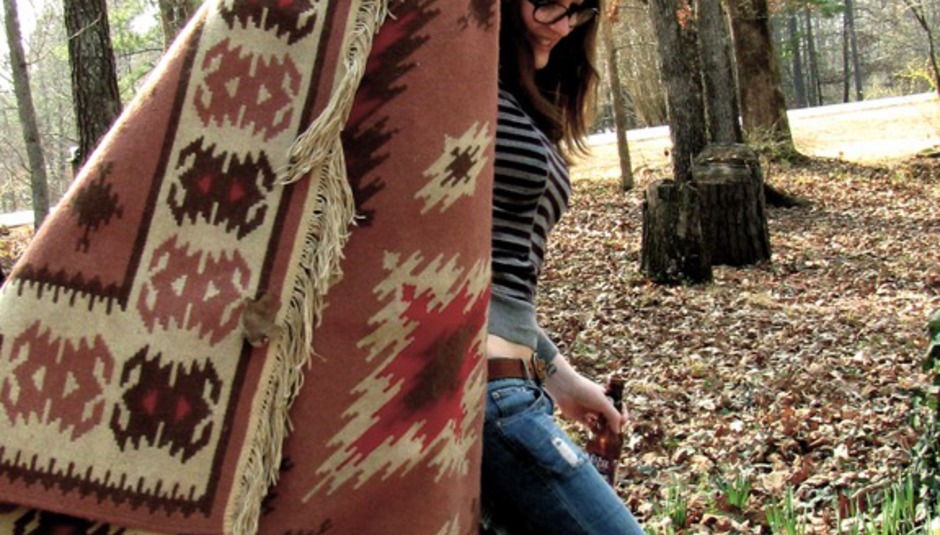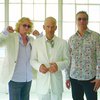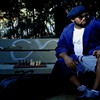It seems fitting that the first edition proper of 2011 should open with an interview with Rachel Evans, whose wonderful Motion Sickness Of Time Travel project – and particularly her Seeping Through The Veil Of The Unconscious LP – has provided the soundtrack to countless January commutes. Hailed by Digitalis founder Brad Rose as the best demo he’s ever received, ‘Seeping Through The Veil…’ is an immensely beautiful combination of bleached ambient wash, fractal electronic pulses and Rachel’s incredible vocals. While the album was released in a highly limited run, there are still copies floating around certain distros, and several other equally excellent releases are available here, at her bandcamp page
Many thanks to Rachel for taking the time to answer these questions.
Firstly, where did the name come from?
I took on the moniker Motion Sickness of Time Travel in late 2008 because I felt people with band names were taken a little more seriously than people who recorded under their own names… at least in my own experience, it was really difficult as a female for people to give my music a chance for the longest time. Another reason why I started MSOTT was that I really wanted to change up my sound and move away from the more singer-songwriter type stuff I had been doing as a teenager. I wanted to experiment more… move away from writing songs and from calling them “songs” and start thinking about the music in more of a sound-scape form. My husband Grant (Nova Scotian Arms) is actually who suggested that I use the name “Motion Sickness of Time Travel” when I first began brainstorming for a title for my new music. Grant took the phrase from William Burroughs novel The Soft Machine. I really thought that phrase sounded like what I wanted my music to feel like and where I wanted my music to take people to. The more music I record as MSOTT, the more I feel like the music has really embodies that phrase.
Was there any particular aesthetic/artistic aim behind the MSOTT project?
Like I said, when I first started recording as MSOTT I just wanted to change my sound, try something different… and it was the first time I really tried to record music similar to the kind of music I was listening to at the time. Honey Owens of Valet was a HUGE influence on my first MSOTT recordings. I always loved her voice. Jackie-O-Motherfucker really helped me to bridge the gap between “writing songs” in more of a folk-style way to just improvising and focusing on actually feeling the music… it took me a really long time to get away from thinking about music in the form of a “song” to being able to really enjoy recording and just improvise. My problem was always thinking too much about it… MSOTT was the beginnings of me not thinking about it too much and just making something I liked… something beautiful just for the sake of it, and consequently music that was a little more unconventional than what I was used to.
How do you approach the writing process? Is it a case of laying down basic structures and then adding effects or are the effects etc a key part of the writing process?
The past year or so my approach has been completely improvisation. However, I still have a certain order in which I record different parts…. Initially I’ll lay down instrument tracks with one of my keyboards, randomly picking a sound and playing around until I find something I really like. Typically the first layer of sound is more of a drone-floor, sort of the base of the “song”. Sometimes it’ll be a sequenced sound, depending on if I’m feeling like recording a shorter or longer track, or what kind of mood I’m in. After I have that first initial track I build on that, recording improvised takes over the previous track layer after layer until it feels thick or thin enough for me. I tend to mix and add effects to the instrument tracks as I go until I get the point where I add vocals. Sometimes I feel like it’s better without voice, in which case the track is done. But if I’m feeling any type of inkling to add more to it, that’s where the vocals come in. The voice is always the last thing I add to any track and I always record my vocals with reverb at least… after recording all the vocal tracks I like to go back and play around with the effects on my voice, sometimes changing the type of reverb… sometimes chopping up my vocal takes into smaller pieces and rearranging them… I also like to reverse a lot of my vocal parts to give it a stranger, more cryptic sound. As for what I say or sing, I never think about it too much… I never write anything down. I’ve never written “lyrics” for MSOTT, but occasionally after recording a track and listening to it after the fact I can remember what I was saying or singing… but it’s all just stream of consciousness, whatever is on my mind tends to be what comes out. If I’m recording while Grant’s not at home, my vocals usually speak of missing him. I also draw from whatever I’ve been reading. “Seeping…” was loosely based on a book about magic, spells and ceremonies I was reading at the time it was recorded. Many of my early MSOTT recordings were reflections or meditations on poems by Sylvia Plath, and some of the literature of Kurt Vonnegut. The recordings I’m working on right now are heavily influenced by Alan Moore’s graphic novels Promethea, which I just finished reading.
On that note, and without giving away any secrets, what’s your set-up?
Ha ha! I don’t really have any “secrets”! But my set up is pretty basic… for most of my MSOTT recordings I run my instruments straight into the line-in jack on my macbook. I use Logic Pro to record, mix and effect everything. The instruments I use now are a Micro Korg, mini Kaossillator, and Dave Smith Mopho synth. I only recently purchased the Mopho after selling my old Roland Fantom X6 a few weeks ago. The Fantom was the main instrument I used to record everything as MSOTT from 2008-2010. In the past I have used programs like Max and Pd to create my own synthesizers and effects, but in the past year I’ve moved away from that… I really love the Mopho since it’s totally analog, it adds a new richness to my sound that wasn’t there before, plus now I’ve got much more control over the sounds than I used to. Vocal-wise I actually record straight into my laptop’s onboard microphone. I’ve used midi-interfaces before and studio mics but for some reason I really love the sound I get from my onboard mic. Live performances are a different story… for live set-up I use a small 8 channel mixer routed to my Vox valve-tronix amp. And for vocals I run a cheap Sennheiser dynamic mic, and recently started using a Boss delay pedal (which I inherited from Grant). I also use my laptop in live performances a lot as an extra instrument (using Max or Pd) and as an effects unit for adding things like reverb to my vocals. The laptop reverb in my live sets really helps to make the performance sound more true to my recorded work.
A lot of the reviews etc I’ve read seem to mention you in relation to Grouper. Is that something you’re happy with or do you think that’s a bit reductive (in the sense that people hear a female voice and some reverb and immediately look to make that association)? For what it’s worth, I don’t really see the similarities...
I am so glad to be answering this question!! Personally, I don’t really see the similarities either, other than like you said, just a female with some reverb. I don’t feel that it’s necessarily reductive, but I do disagree with that comparison. Although it’s really flattering to hear and I really enjoy and respect Liz’s music and art, Grouper was never a big influence on my MSOTT sound.
There seems to have been an explosion of great ambient music during the last couple of years. What do you think that’s down to and, on that note, where do you see yourself fitting into the contemporary scene (if one even exists)?
Yeah the surge of music coming out of the underground right now is incredible! It’s really encouraging to be recording music “alongside” so many great musicians and artists. Personally, I feel the explosion is due to all the networking artists and musicians can do with the many social networks that are available online. For years both Grant and I have been producing music steadily, but making connections with people on the web is what got us in touch with everyone we are working with now, be it labels, musicians, or artists. Less than a year ago the two of us couldn’t even give our music away (and believe me, we tried!). We were basically unaware of the majority of what was going on in the American underground. We owe a lot to Brad & Eden at Digitalis, Matt & Hillary at Existential Cloth, and Bruno at Ruralfaune for taking those first chances on releasing our projects. That really opened so many doors up for us. Now all of our closest friends are incidentally spread out all across the country and the world, it’s crazy what a little networking can do. We talk to our online pals about a million times more than we talk to “friends” in real life, of which we have very few. I think a lot of it has to do with many of the artists, like myself, being located in smaller, more rural areas. The only way for us to share our music, because of our location, is via the internet. We rarely get the opportunity to play shows since there isn’t a music venue in our town, or any surrounding towns. Yeah I totally think there’s a contemporary scene; the American underground music arena right now is really closely tied into the current tape scene and “cassette culture”. It’s kinda funny how we’re fueled by all this technology but the thing that really bonds us all (at least all the people we’ve know and deal with) is cassettes and other analog formats. I’m not sure where I fit in, but I definitely feel a part of a community and a certain connection with most everyone making music in the same vein as us right now. We’re all in love with the same aesthetics. Of course, I feel a huge connection to anyone whose music we’ve released on Hooker Vision (the label Grant and I run). Most of the people making music that we’ve released also run their own small labels, and in turn we end up releasing our music on their labels… it’s a never ending beautiful cycle and a constant encouragement to keep making music. We’re all influencing each other and really fueling each others creativity.
For me, there seems to be a heavy element of nostalgia running through your music. Is that something you try to evoke and if so, why?
Nostalgia isn’t really something I’m aiming for; I guess it’s just a side-effect. I just try to make something that feels good me to when I record it. I always try to make it sound as beautiful as I can. I like to think that my music can mean different things to different people… I definitely try to create an “environment” within my music; I want it to take people to another place. I guess for some people that place is more nostalgic than others… I think it all depends on what state your mind is in when you embark on listening.
On that note, there seems to have been a very calculated engagement with ideas of pop-cultural nostalgia by certain artists over the past couple of years (I’m thinking stuff like Rangers, Hype Williams, all those warped takes on 80s pop music). How do you feel about that? Is that something you could see yourself exploring? (Feel free to ignore this question if I’m way off the mark with the previous one)
Well I wasn’t born until 1988 so I totally missed the 80’s! Ha ha . I’m drawn to music that sounds “80’s” a lot because I grew up in that period when 80’s sounds were morphing into early 90’s sounds, but it’s not something I try to explore intentionally… if that kind of sound comes out in my music it’s purely coincidence.
Judging by your blog, you’ve got a pretty prolific year ahead in terms of releases. Can you give a run-down of what we’ve got to look forward to?
Yeah this coming year is going to be an interesting one! Most of the release I have listed as upcoming are all completely finished being recorded. Solo wise, I’ve got a slew of cassette tapes releases coming up on labels like Sweat Lodge Guru, Teosinte Records, Hooker Vision, Tranquility Tapes, Hobo Cult Records, and Digitalis Limited. I’ve also got a solo track featured on two upcoming compilations for Sacred Phrases and the next installment of Ladyz N Noyz (Corpus Collossum). I’ll also have a 20-minute video-work featured on a Sacred Phrases video compilation too, alongside the video works of Montreal’s Moduli TV, Dry Valleys and more. Vinyl-wise, I’ve had the music completed for my upcoming Digitalis LP “Luminaries & Synastry” completed for since November 2010, and it’s due for release late summer/early fall. The LP will come with a CD that includes bonus tracks (out-takes from the LP). The MSOTT cassette tape on Digitalis Ltd. will be released at the same time, it’s a collection of the rest of the out-takes from L&S. In all I recorded approximately two hours of music for L&S so I’m really glad that all of the tracks are going to see release together like that. Currently I’m working on recording the music for a vinyl for Spectrum Spools which will likely be a double LP. There are a lot of other MSOTT releases in the works too for 3” cdr’s… so yeah tons of new MSOTT to look forward too!
What I’m probably more excited about than anything else right now is the upcoming Quiet Evenings releases. Quiet Evenings is name Grant and I record as a duo under. We’ve been working really hard on two upcoming albums, one for Preservation Records out of Australia called “Transcending Spheres”, and also for our first LP “Intrepid Trips”, to be released on Hooker Vision. You can expect both of those releases out by or over the course of summer 2011. Quiet Evenings will also be playing at the United State Arts Authority for SxSw in TX on March 14th. We’ll have a bit of merch to sell, including lots of MSOTT, Nova Scotian Arms (Grant’s solo project), and Quiet Evenings music so if you’re in the area, it’ll be a good time to pick up copies of some of our latest releases.
Finally, if you want to add anything else, please feel free to do so!
Almost as soon as I became in touch with Brad (Digitalis/North Sea/Ajilsgava/etc.), he and I began working on a collaborative project called Aerial Jungle. So far we’ve only released a 3” cdr on Hooker Vision, but we have a lot completed tracks that will hopefully be released in the near future, so keep an eye out for that project!

On the rare occasions I’ve been able to drag myself away from Seeping..., the majority of my has been taken up with Ravedeath, 1972, the new record from quite possibly the finest ambient artist currently operating, Tim Hecker. In all probability, the amount of (digital) ink that’s already been spilled on this record effectively renders my opinion entirely redundant, but suffice to say this up there with Hecker’s finest work. Those who witnessed he’s crushing set at ATP last December will already be well acquainted with the shimmering arpeggios that cut through opener ‘The Piano Drop,’ but it’s the way Hecker transforms his basic source material into a wash of bleached analogue hues and submerged, half-heard melodies that really impresses. Put simply, this is about as essential as they come.
Equally outstanding is Owl Splinters, the long-awaited new record from Deaf Center (A.K.A. Erik Skodvin and Otto Totland). With their debut ‘Pale Ravine’ long out of print and having acquired something close to legendary status, it’s fair to say expectations were high for this latest offering but somehow it exceeds even the heights of the duo’s first album. Avoiding the excessively saccharine melodies that plague so much of the neo-classical genre, Totland’s piano work is both subtle and incredibly moving but it’s the way in which it contrasts with the vast storm clouds and caverns generated by Skodvin’s cello, as on the album’s hulking centerpiece ‘The Day That I Would Never Have,’ which really astounds. Elsewhere, the appropriately titled ‘Animal Sacrifice’ represents just about the most harrowing piece of music you’re likely to hear all year, as Skodvin slashes at his cello with an almost palpable violence, while the lambent drones of ‘Close Forever Watching’ seem to swell and subside with an organic logic. Scope the entire album here.
If Owl Splinters is being almost unanimously hailed as something of a classic, then the same can’t be said for ‘Perfect Life,’ the first track to be made available from New Orleans duo Belong’s forthcoming full-length on Kranky, Common Era. Unsurprisingly, it’s the inclusion of percussion and – shock horror – vocals which is causing the controversy, but if this first transmission is indicative of the album as a whole, then expect something along the lines of Slowdive as remixed by Wolfgang Voigt and William Basinski, which would make it just about the best thing ever (as you might have guessed, I reckon it’s absolutely killer). Check it out, and decide for yourself, right here:
No edition of this column would, of course, be complete without touching upon some Barn Owl-related goodness and thankfully the next month should see the release of records by both Higuma and Evan Caminiti. More on those next time, but for now check out select cuts from both at these locations: rootstrata.com and stereogum.com
Barn Owl will also be touring the UK, alongside Jefre Cantu Ledesma, next month.
Expect an interview with Jefre in next month’s column but until then, thanks once again for reading.






















